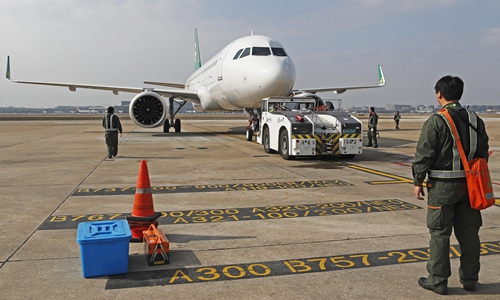HOME >> SOURCE
More commercial airlines operate cargo-only services to China
By Tu Lei Source:Global Times Published: 2020/3/31 13:25:12

A Spring Airlines plane at Shanghai Hongqiao International Airport in December 2019 Photo: cnsphoto
With many airlines in the world canceling or sharply reducing their international flights, a rising num-ber of passenger planes now sit idle in airports.
Some carriers have found another use for them, as more commercial airlines are now operating cargo-only flights, using not only their cargo-hold capacity but also passenger cabins to transport medical supplies and daily necessities.
Qatar Airways has become the first Middle Eastern carrier to resume belly-hold operations to all of its destinations in China, leveraging the flexibility and reliability of its modern fleet of 250 aircraft.
The airline said in a release sent to the Global Times that its airborne cargo services to Beijing had re-sumed on Monday, while services to Shanghai, Chengdu and Hangzhou cities will resume on Tuesday, and service to Guangzhou and Chongqing will resume on Wednesday.
The carrier said it will add an additional 600 tons to its weekly capacity, bringing its combined weekly ca-pacity out of the country to more than 1,300 tons.
Qatar Airways is not alone. Delta has also resumed regularly scheduled operations from China with the launch of cargo-only flights between Shanghai and Detroit. The flights will operate three times weekly using an Airbus A350-900 aircraft, a jumbo jet that can carry 49 tons of cargo in its hold.
Air New Zealand's Boeing 787-9 arrived at the Shanghai Pudong International Airport on Tuesday, also converting its passenger capacity to cargo-only flights.
Xiamen Airlines is adapting to the trend too. On Saturday, a Boeing 787-9 carried up to 20 tons of medical supplies from Xiamen to Kuala Lumpur, Malaysia, the first time the carrier has flown with cargo using its cargo hold and passengers cabin.
Analysts attributed the widespread moves to the fact that China's air regulator has phased in strict measures to cut down international flights, but has allowed cargo flights to continue without interrup-tion. Rising international cargo prices also likely contributed to airline shifts, allowing cargo revenues to compensate for lost passenger income.
Brent crude fell to $22.58 a barrel at one point on Monday, hitting its lowest point since November 2002, and oil prices account for more than 40 percent of flying costs.
On Sunday, an official from the Civil Aviation Administration of China said the CAAC will encourage airlines at home and abroad to carry out freight charter flights and use idle passenger aircraft to op-erate cargo flights, in a bid to ensure the stability of the international air cargo supply chain while the coronavirus is raging in the world.
The CAAC said Chinese and foreign airlines' all-cargo international flights will increase to 930 flights per week, close to pre-pandemic levels.
Posted in: INDUSTRIES